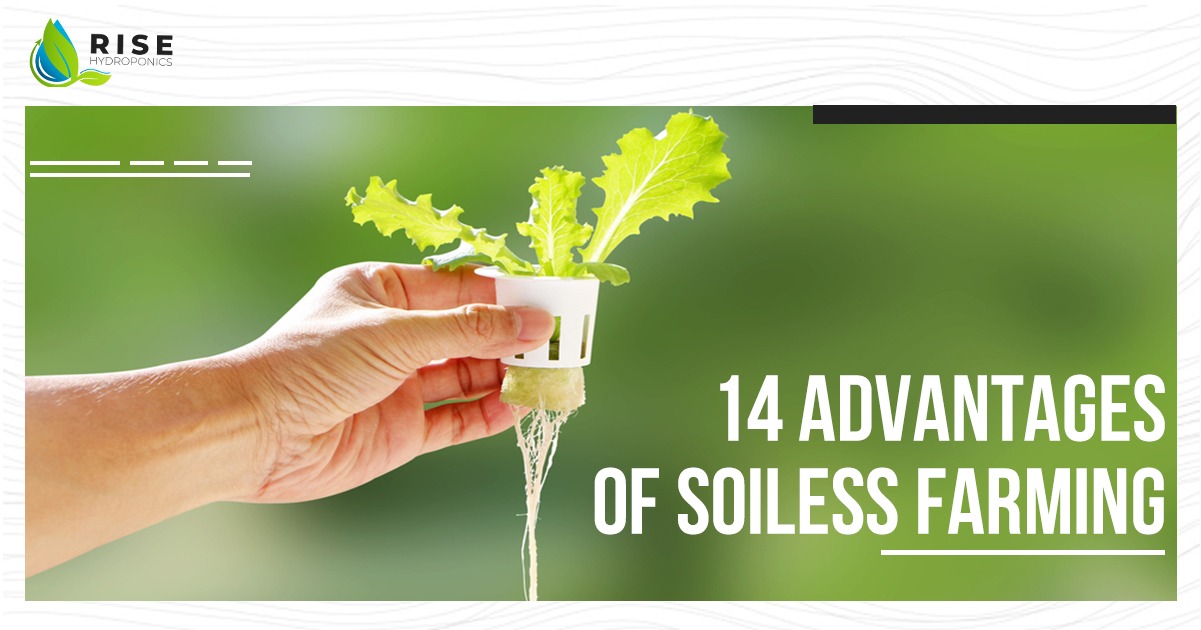Soil Less Farming : Are you a naturalist who loves to grow everything under the sun? Well, then this blog discussing the benefits of hydroponic farming will surely excite you. Now, first thing first, you do know that it is a lot more “natural” to grow with the help of nature. However, your plants will always be at the mercy of several pest-related and environmental variables.
This means that pestilence, wind, cloud cover, cold, heat, and humidity are not under your control. So, what do we do? How about going soilless? Hydroponics is the potent solution. You must be thinking, how? Well, read on to find out.
- Combats climate change
- Crops grown are easier to control
- Reduces species extinction and environmental damage caused by intensive farming and overexploitation
- More rational use of the scarcer resource: water
- Crops grown are more profitable

There are definitely no two ways about why traditional agriculture methods are such an art. But hydroponics is the science in which every element determines the growth of plants in a controlled manner. Have all these facts energized you about this gardening method? Read on to know the top 14 benefits of having a hydroponic farm or garden.
1. Grow green galore!
A hydroponic garden can present you with a wide variety of green plants. If you think of growing any kind of herb or leafy green, this method is one fantastic way to do that.

Are you wondering what all you can grow? Everything from flowers to chamomile, catnip, pepper, zucchini, mint, and tomato can be grown effortlessly. If you are a weight watcher who has to survive on salads, we say grow parsley, thyme, romaine lettuce, kale, arugula, iceberg lettuce, spinach, and butterhead with absolute ease!
2. Soil Less Farming method is water-saving
Everyone knows that agriculture ends up using a whole lot of water. There is also no running away from the fact that water is the world’s most treasured resource. Yet, for traditional agriculture, you need an endless supply of that. But fret not, we say. A soil-less farming method eases the burden on the water supply. Here’s how.
- Your plants are rooted in an inert medium of growth
- An in-line pump circulates water enriched with nutrients through the plant’s root system
- You employ overhead lighting, which permits plants to finish their photosysnthesis cycle
- Inert growing media lets you exact the fertilizer amount you will use
- As a result, the roots of your plants get more oxygen
3. No acres of land required
The most notable benefit of soil less farming is that you need a fraction of the footprint to grow the plants of your choice. Agriculture ties up a particular land amount for a specified duration. With hydroponics, you have multiple options. Limited space either in your alleyway, front yard, or backyard will let you produce significant quantities of food. You can grow them in any area, be it a soil-less place, a nutrient-deficient soil region, water-logged, or snow-capped soil area.
4. Soil Less Farming Facilitates microclimate
The hydroponic systems offer you complete control over the climate you need to grow your crops. You will be in complete control of adjusting the air, carbon dioxide, humidity, light, and temperature. The best part – you can adjust the nutrient concentrations as per the requirements of different greens and veggies.

5. Soil Less Farming provides enhanced quality of the produce
Growing plants hydroponically enhances the taste and quality of the produce. That is because the entire system uses clean water and high-quality nutrients in a controlled environment. For this reason, the greens you grow in a hydroponic system taste better and are also more nutritious.

6. Excellent pH control
pH is the determining factor when it comes to gardening or farming. Any plant grows well in acidic or neutral media. If you are growing your plants in soil, you need to add some organic matter or acidic fertilizer. But your hydroponic garden only requires a little bit of pH buffer solution.

7. Efficient nutrient supply
When you adopt a hydroponic system, you can supply nutrients with loads of accuracy and precision. Plants do not have to invest time to develop their root systems to search for nutrients. All they have to do is focus on growing efficiently and faster. The nutrients will be delivered into the reservoir of water supply and then circulated round the clock. This method will let the plants absorb nutrients effectively without any development of waste.
8. Consistency and faster rate of growth
One of the most popular benefits of hydroponics is a faster rate of growth. That means you can get your hands on your harvest sooner. Since you are in complete control of resource usage, you are the one who creates an optimal environment for growth. With hydroponic plants growing 40-50 percent faster, you can grow your greens within no time.

9. Minimal restrictions
When you grow a hydroponic garden, you come across minimal restrictions in terms of location and space. That is because this method is all about controlled conditions of growth and compact size. The best part about hydroponics is your ability to grow many plants in a soil-less arrangement compared to an open field.
10. Forget herbicides and pesticides
Conventional farming requires a whole lot of herbicides and insecticides for the successful growth of crops. After all, this farming method exposes crops to multiple climatic conditions that support weeds and pest infestation. On the other hand, a hydroponic garden does not use soil; hence, there are no pest attacks and flaring up of weeds. Thus, you can sell your produce without any pesticide residue.
11. Soil Less Farming is Friendly for the environment
If you ever look at the land-use statistics, you may have undergone a massive cardiac attack. Would you believe that pastures and forests are cleared for farming every year to feed the increasing number of people? Well, hydroponics will help in lessening the impact. Hydroponics does not emit any toxins and performs better in limited space. You do not have to fear considerable amounts of water being used, land erosion, or harsh climates.
12. No weeds, diseases, or pests
Many pests and diseases are born in soil. These two together infest your garden during the growing process. Weed is another sneaky thing that can take place. Weed seeds may remain dormant and suddenly regrow once there are favourable growth conditions. But hydroponic farming does not scare you with such an ambush. In soil-less conditions, you are saved from the trouble of battling weeds and diseases of pests.

13. Very simple
Of course, hydroponic farming is not simple per se, but it is easy. That is because you can grow your garden without any generational knowledge passed down to you. You also do not need truckloads of capital, rather a little bit of research, and you are good to go.

14. No such thing as seasonality or predictability
Have you ever bought something as basic as beans in the summer season? Have you noticed the price difference from winters? This price difference is an outcome of lack of harvest and seasonality. French beans are cheaper in winters because they grow well in winters but during summers, it is a tough task to buy them at the same price.
Thus, hydroponics comes into the foray and guarantees reliability and consistency in crop production. You can enter into long-term contracts with farmers maintaining a fixed price. Hence, it is a win/win situation for both the buyer and the farmer as hydroponics mitigates risks.
Soil Less Farming is the way to be
Our population is growing geometrically, and the production of food is growing exponentially. We really need to rethink how billions of people will be fed by 2050. When hydroponics can make anyone a food producer all year-round then why not turn to that? Grow your own mint and make your own mojito!


Great info. Lucky me I came across your website by accident (stumbleupon). I’ve book-marked it for later.